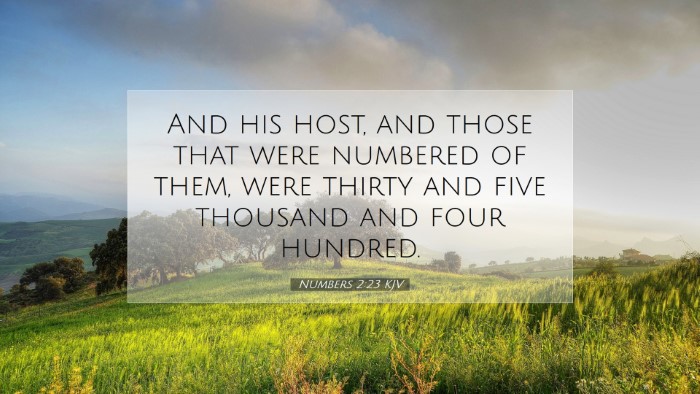Commentary on Numbers 2:23
Verse Reference: Numbers 2:23 - "And those which camp by him shall be the tribe of Ephraim: and the captain of the sons of Ephraim shall be Elishama the son of Ammihud."
Contextual Background
This passage is situated within the broader narrative of the Israelites' journey through the wilderness as they prepare to enter the Promised Land. The organization of the camp around the tabernacle is a vital element of their communal and spiritual life. Each tribe is assigned a specific place, accentuating their unique roles and responsibilities.
Tribal Significance
The tribe of Ephraim holds a prominent position in Israel's history and is representative of a significant portion of the northern kingdom. Ephraim's inclusion among the leaders of the encampment highlights its stature and importance. Ephraim and Manasseh, the sons of Joseph, symbolize the heritage and legacy that Joseph himself represented.
Insights from Public Domain Commentaries
Matthew Henry's Commentary
Matthew Henry highlights the orderly arrangement of the tribes as they encamp around the tabernacle, emphasizing the divine direction leading to an organized worship community. The selection of Ephraim as a lead tribe reflects the providential order in God's plan:
- Ephraim's Leadership: Henry notes that Ephraim was chosen to lead due to the blessing Jacob bestowed upon Joseph's sons. This leadership is symbolic of greater responsibilities.
- Importance of Organization: The structure in which the camps were arranged serves as a reminder of the importance of order in the worship of God, as chaos would not glorify Him.
Albert Barnes' Notes
Barnes elaborates on the significance of Ephraim's position in relation to logistics and military readiness:
- Military Readiness: The tribe of Ephraim is noted for its military capacity and readiness. Their leadership role suggests not only a spiritual but also a strategic advantage as they organized for potential conflicts ahead.
- Covenant Blessing: Barnes draws attention to the importance of recognizing Ephraim as one of the tribes that inherited God's covenant, particularly underscoring the grace involved in their selection as leaders.
Adam Clarke's Commentary
Clarke provides additional insights into the specific individuals mentioned and their roles:
- Elishama’s Leadership: He identifies Elishama, son of Ammihud, emphasizing the significance of his role as captain of the tribe of Ephraim and suggesting a theme of divine appointment. Clarke notes the biblical importance of leaders being chosen directly by God.
- Symbolic Representation: Clarke discusses how Ephraim, being one of the two tribes of Joseph, symbolizes strength and fruitfulness which God desires among His people.
Theological Reflections
The selection of Ephraim as a leading tribe can be seen as a microcosm of God's larger purpose for Israel. Each tribe has a unique function, mirroring how believers today are called into diverse roles within the Body of Christ, as outlined in Paul's letters (1 Corinthians 12). The balance of leadership and unity signifies that while roles may differ, they all contribute to the movement toward a divine promise.
Implications for Church Leadership
The structure and leadership exemplified by the tribe of Ephraim can provide critical insights for modern church governance:
- Divine Appointment: Leaders in the church should seek affirmations of divine calling, paralleling the example set by Elishama.
- Team Effort: Just as the Israelites had various tribes, church leaders should recognize the strengths and roles of various church members, fostering collaboration.
Conclusion
Numbers 2:23 serves as a rich text for understanding both the historical and practical dimensions of tribal organization in ancient Israel. The lessons gleaned from the arrangement of the camp, the roles of leadership, and the emphasis on divine appointment resonate powerfully within the contemporary church context. Pastors, students, theologians, and Bible scholars are encouraged to reflect on these insights as they engage in studies of community, leadership, and divine purpose.


